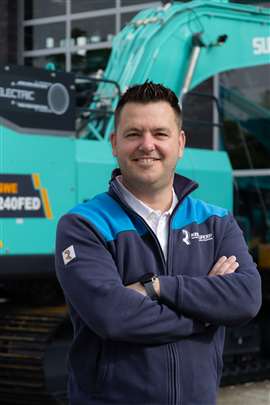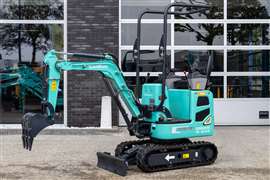European dealers weigh the benefits of buying Chinese EV equipment
16 August 2024
Like many construction equipment dealers and rental companies across Europe, Kemp Groep is dipping its toe in the market for Chinese-manufactured, battery-powered construction equipment. But at a time of strained international relations between Beijing and Brussels, and a shift to the right in domestic politics, the decision to invest is becoming less clear cut. Lucy Barnard reports.
“The Chinese have the knowledge of electric vehicles,” says Wilco van Klaveren, a branch manager at Dutch equipment dealer Kemp Groep. “China already uses many electric vehicles and machines but in Europe we don’t get much of the electrification.”
Like many construction equipment dealers and rental companies across Europe, Kemp Groep is dipping its toe in the market for Chinese-manufactured, battery-powered construction equipment. But at a time of strained international relations between Beijing and Brussels, and a shift to the right in domestic politics, the decision to invest is becoming less clear cut.
 Wilco van Klaveren, a branch manager at Dutch equipment dealer Kemp Groep, poses in front of a Sunward electric excavator. Photo: Kemp Groep.
Wilco van Klaveren, a branch manager at Dutch equipment dealer Kemp Groep, poses in front of a Sunward electric excavator. Photo: Kemp Groep.
Kemp Groep, which is the largest specialist in earth moving and road building equipment in the Netherlands and which, since 2012 has been part of Dutch machinery distribution giant Royal Reesink, earlier this year struck a deal with Chinese OEM Sunward for the distribution rights for electric mini and crawler excavators in the Netherlands and Belgium, and acquired four machines for its own rental operation, Huur & Stuur.
The four excavators which the company purchased to run through its Huur & Stuur (rent and steering) division comprise two tracked medium excavators and two tracked mini excavators. So far, the company says its dealership arm has sold four of the larger machines and three of the smaller size.
For Kemp Groep and its parent Reesink, the decision to partner with a Chinese manufacturer is quite a gamble. The European Commission is widely expected to hike tariffs on Chinese electric vehicles, potentially pushing up the costs of new electric vehicles inside the EU by billions of dollars overall.
Last year, the UK government launched an investigation into alleged so-called dumping of subsidized excavators on the UK market. And this year, the US government announced it was raising tariffs on a range of Chinese goods including construction machinery.
Van Klaveren says that the larger machines cost around €470,000. This compares with a similar diesel machine which would probably cost around €250,000 – effectively making the electric machine double the price. In terms of rental, the difference is even more stark. The company rents out its 24-tonne electric excavators for €3,000 (US$3,300) a week while a similar diesel machine costs just €1,000 (US$1,100) over the same period.
As machines without a track record, Kemp Groep says it will find it hard to predict the value of the machines in its rental fleet in the coming years, but it is hoping that it will be able to sell ex-rental machines back to China in much the same way that European companies frequently sell ex-rental machines to customers in Africa.
Cheaper to buy
“The electric machines from China are cheaper to buy and probably have a higher residual value, which calculates twice in the right direction,” van Klaveren tells Construction Briefing from his depot in Bergschenhoek near Rotterdam. Moreover, in China they have all the components to develop and make batteries. Because of these circumstances, we think we can sell these machines (back) to China and start offering a new generation of machines in Europe as well.”
And, van Klaveren adds, for Kemp Groep, much of the decision to go with a Chinese manufacturer was about finding an OEM selling electric machines which did not compete with the other brands the company already carries, which effectively ruled out many European alternatives.
 One of Kemp Groep’s new 6-tonne tracked electric excavators. Photo: Kemp Groep
One of Kemp Groep’s new 6-tonne tracked electric excavators. Photo: Kemp Groep
“In order to be able to supply electrical machines, we first took stock of our existing suppliers. What was really very important to us in this respect was that we would have an original machine built as an electric machine in the delivery program,” van Klavaren says.
“We have a number of major brands that we distribute and rent such as Kobelco, Bomag, Atlas and Kramer. We have been looking for a good partner who does not compete with the brands we already have, and who can also supply electric (excavating) machines. In the search we came in contact with Sunward.
At Sunward there was very quickly the realization that marketing electric machines requires a capital-powered dealer organization like Kemp Groep with 12 branches in the Netherlands and Belgium.”
In terms of strategy, Kemp believes that by having the flexibility to move electric excavators between its rental and for sale fleets, the company can help customers to try out the new machines before they commit to a purchase – and also in times when the company is struggling to get hold of new machines to sell to customers, it has the option to sell models from its rental fleet if needed.
“We get many questions from our customers regarding electric machines for both sales and rental,” he says. “This got us thinking about the demand from our customers for the availability of electrical equipment. Is it right to invest to meet the demand? The government in the Netherlands is increasingly indicating in tenders that the work may only be carried out emission-free.”
Government climate measures
Under pressure from environmental groups to reach challenging carbon reduction targets which would mean CO2 emissions are 55% lower than 1990 levels by 2030, the Dutch government has been implementing a raft of climate measures including a higher CO2 tax for industrial companies, €600 million in subsidies for second-hand electric cars, and strict rules to curb the use of internal combustion engines used in public works.
“By having the machines available for sale and rental, we can offer a solution for all our customers. When you look at the price, not all entrepreneurs can buy an electric machine for one particular job,” van Klaveren says. “In addition, our business is very cyclical. Supply and demand vary by the week and sometimes by the day. This allows our sales and rental departments to work closely together.”
As such, the company estimates that between 5% and 10% of its fleet of 1,500 items – from grabbers to 50-tonne excavators – is currently electric but it is already planning to increase that further with a planned purchase of two more wheeled excavators from another Chinese brand.
“In the Netherlands, the government has introduced conditions for many cities and areas that require electric machines. In the inner cities of Amsterdam, Utrecht, The Hague and Rotterdam, for example, you are only allowed with electric vehicles and machines,” van Klaveren says.
Nonetheless, like many companies across Europe, looking to transition from fossil fuels, Kemp Groep is aware of the continent’s changing political landscape.
In November 2023, Geert Wilders’ right wing PVV party won a victory in the Dutch elections, leaving climate activists fearful that the country’s new right-leaning coalition government will roll back climate policies under new prime minister designate Dick Schoof. One of Wilders’ election messages was that he would not waste billions of Euros on “pointless climate hobbies.”
“Because of the change of government, we seem to notice that our customers are a bit reluctant to buy new equipment,” says van Klaveren.
And Dutch equipment dealers and rental companies are not alone. Across Europe, populist political parties have been gaining votes, threatening to take away government subsidies and climate-friendly policies.
Since the election of prime minister Giorgia Meloni in Italy in 2022, the government has been pushing back on EU initiatives to phase out combustion engines and improve energy efficiency in buildings. Finland’s election last year resulted in a four-party coalition including the far-right Finns Party, which is sceptical about the country’s climate targets.
And support for parties unhappy with the sacrifices that governments insist are needed to combat the climate crisis have also won ground in Greece, Spain, Germany, France, Austria, and Sweden.
But van Klaveren says that Kemp Groep remains committed to its investment in battery-powered equipment.
“We think the big cities will continue to demand electric equipment in their tenders,” he says. “But it’s not just about the government and its rules. There are many more advantages to using electric equipment. One advantage is that the employee next to the machine is not bothered by the diesel air and noise.
“For indoor demolition work, an electric machine with no emissions is also a big advantage. We expect electrification to continue. Overall, the electric branch of the company will continue to grow. ”
STAY CONNECTED



Receive the information you need when you need it through our world-leading magazines, newsletters and daily briefings.
CONNECT WITH THE TEAM






